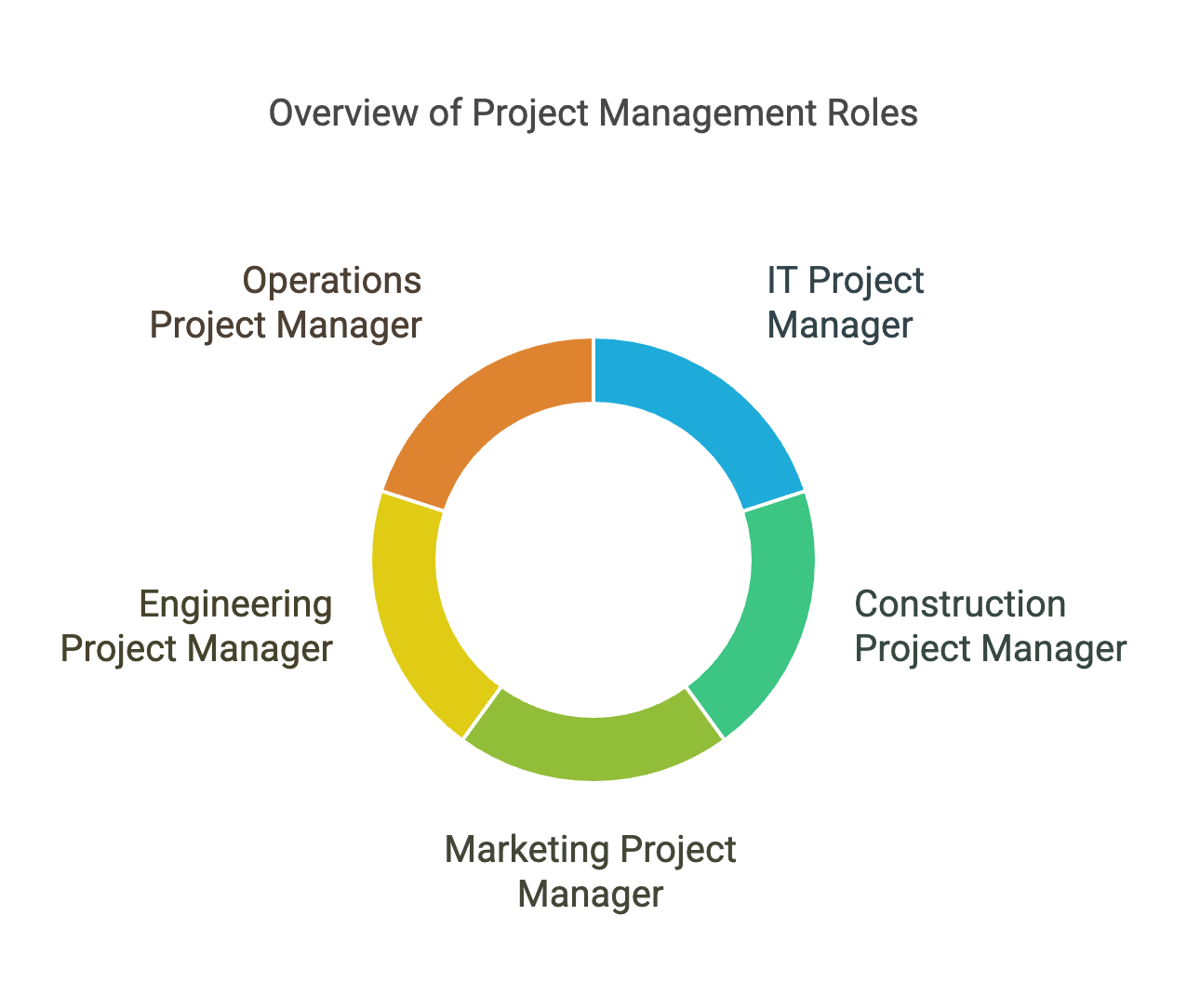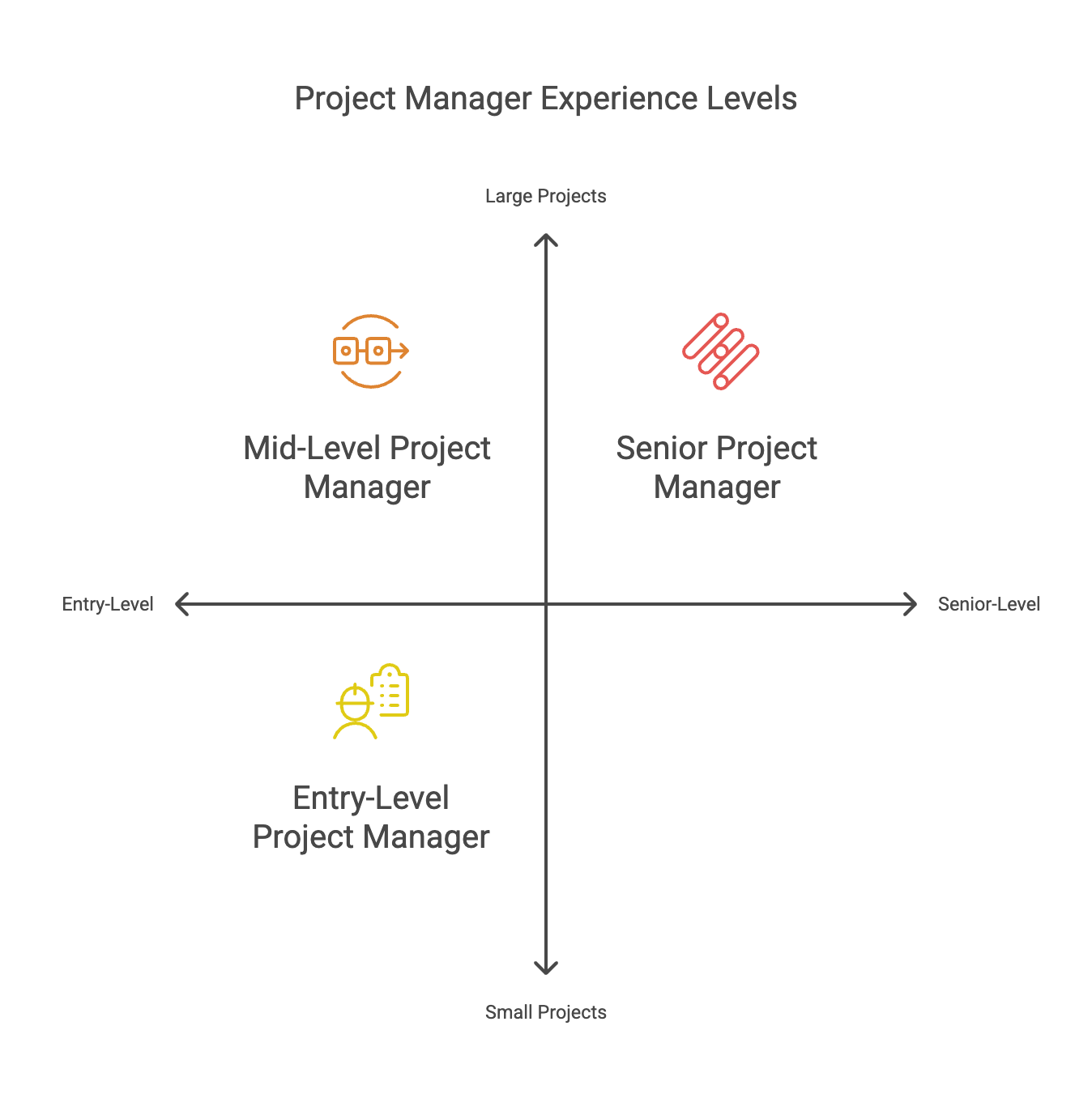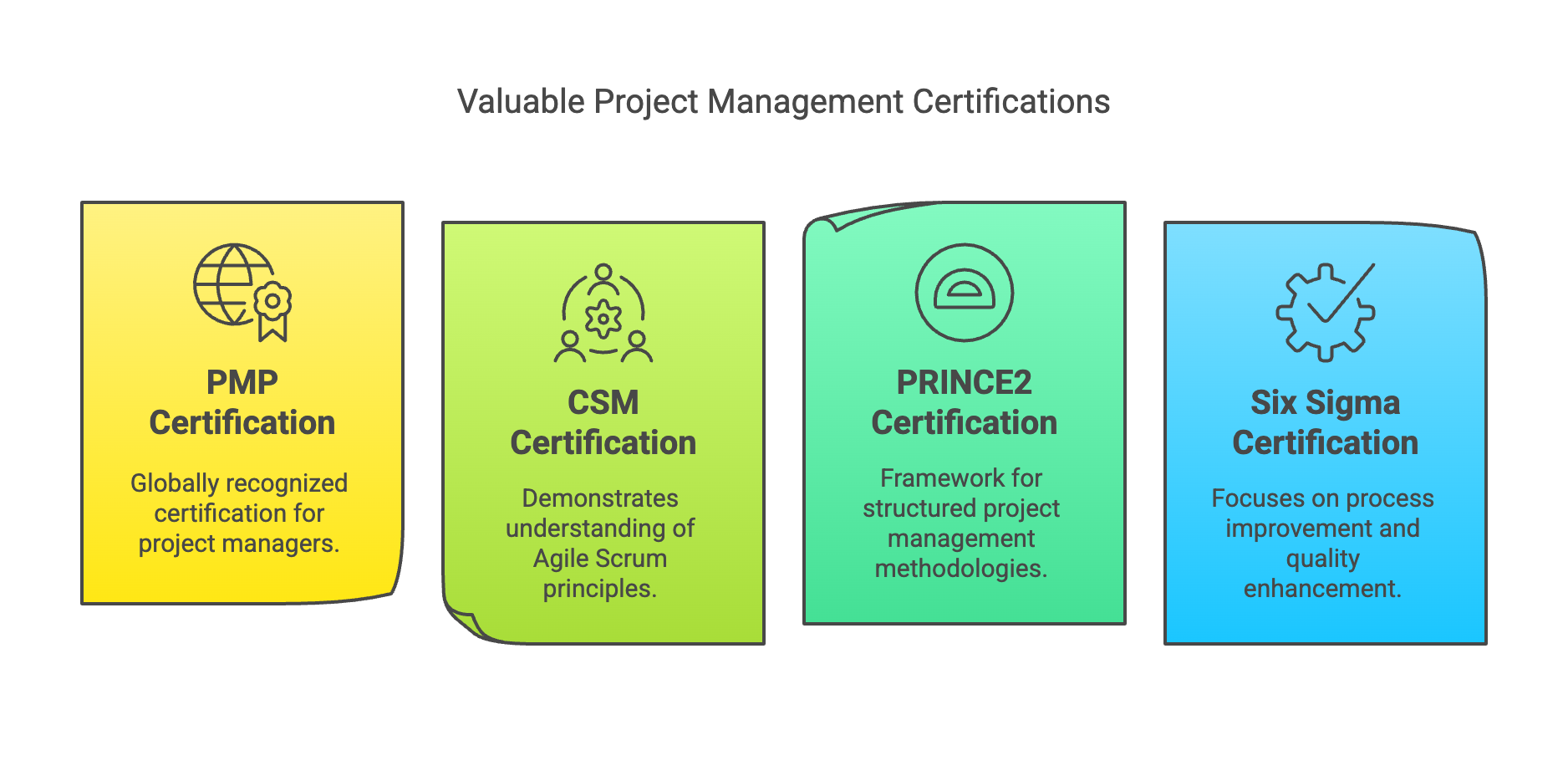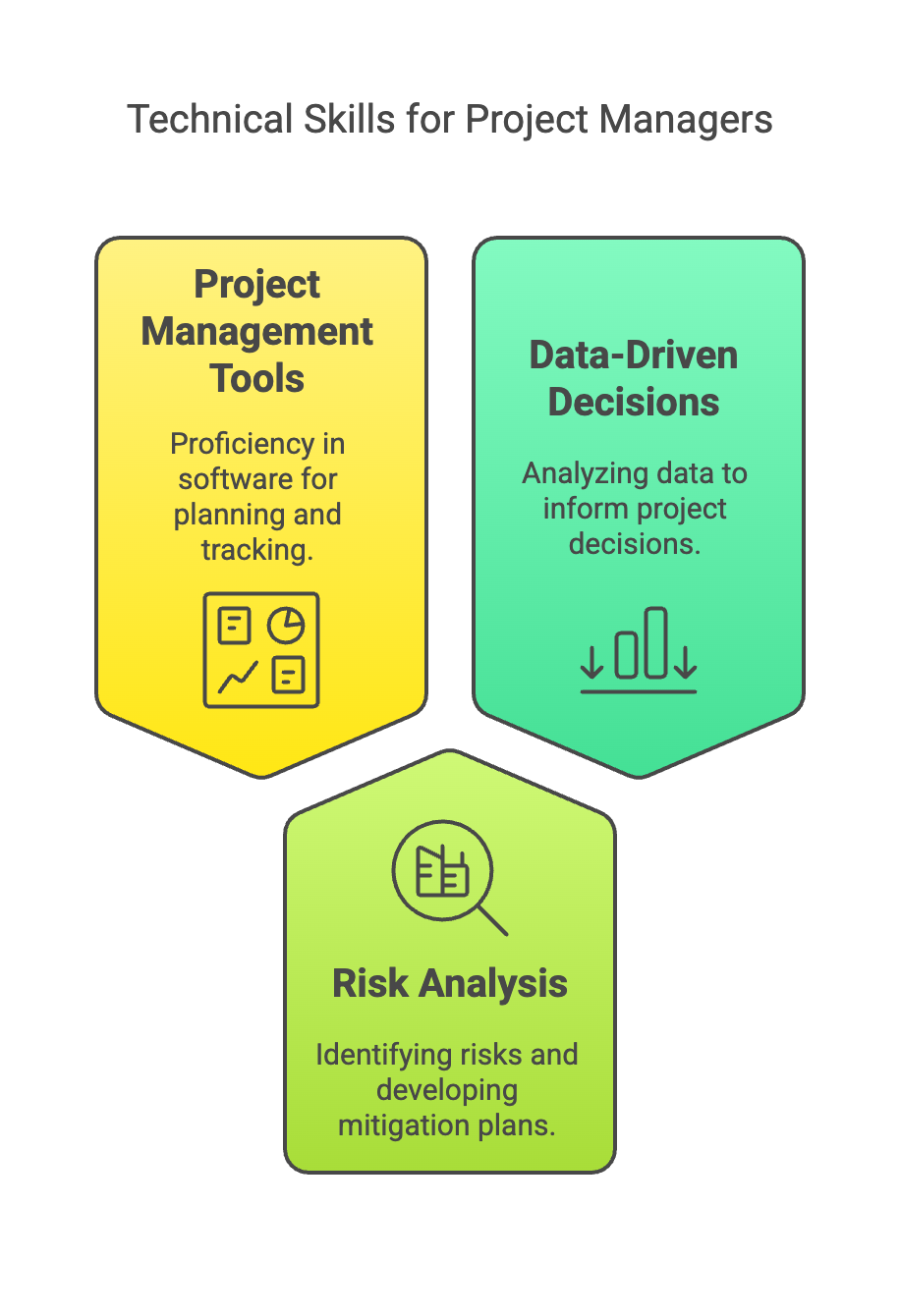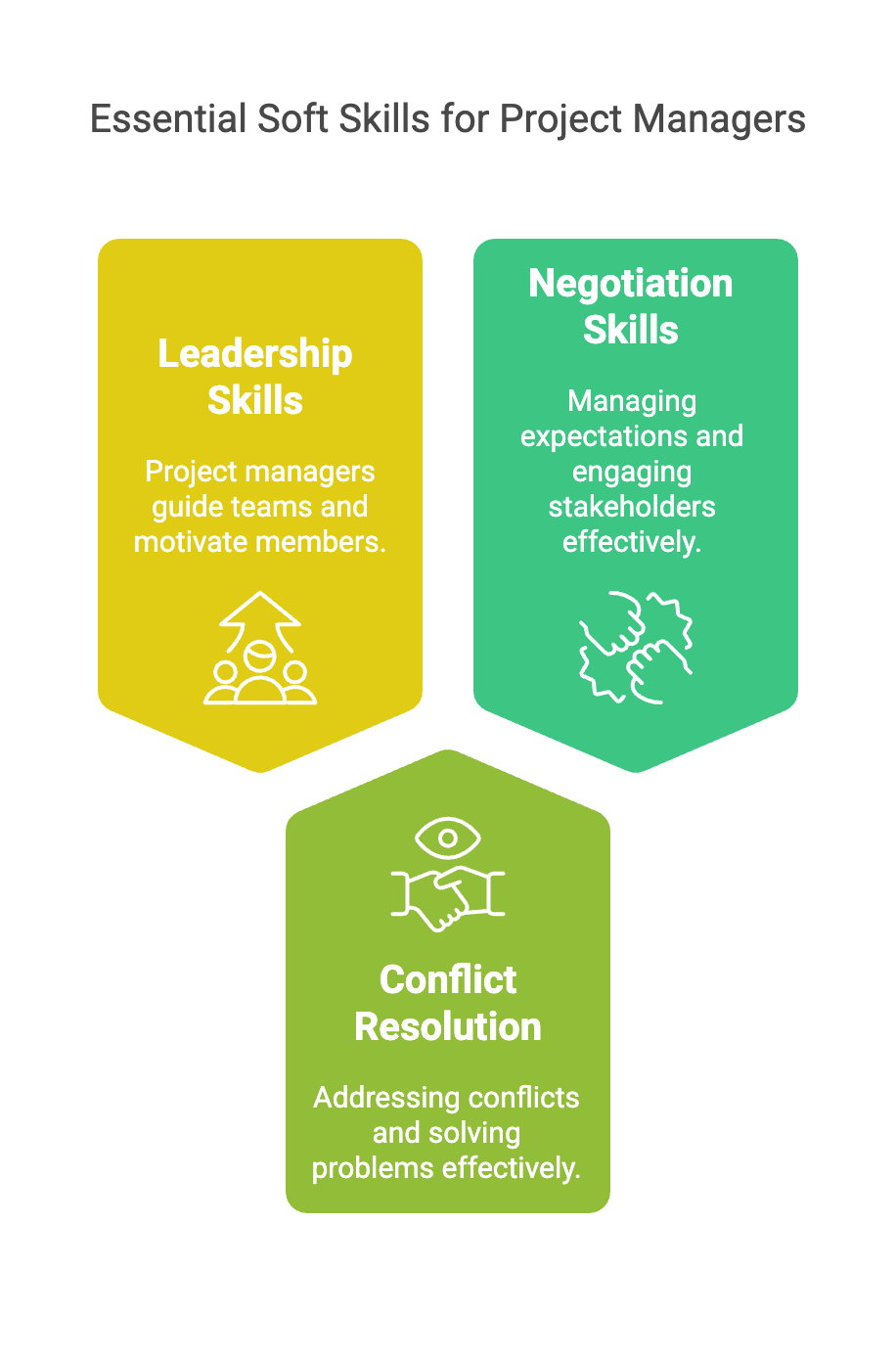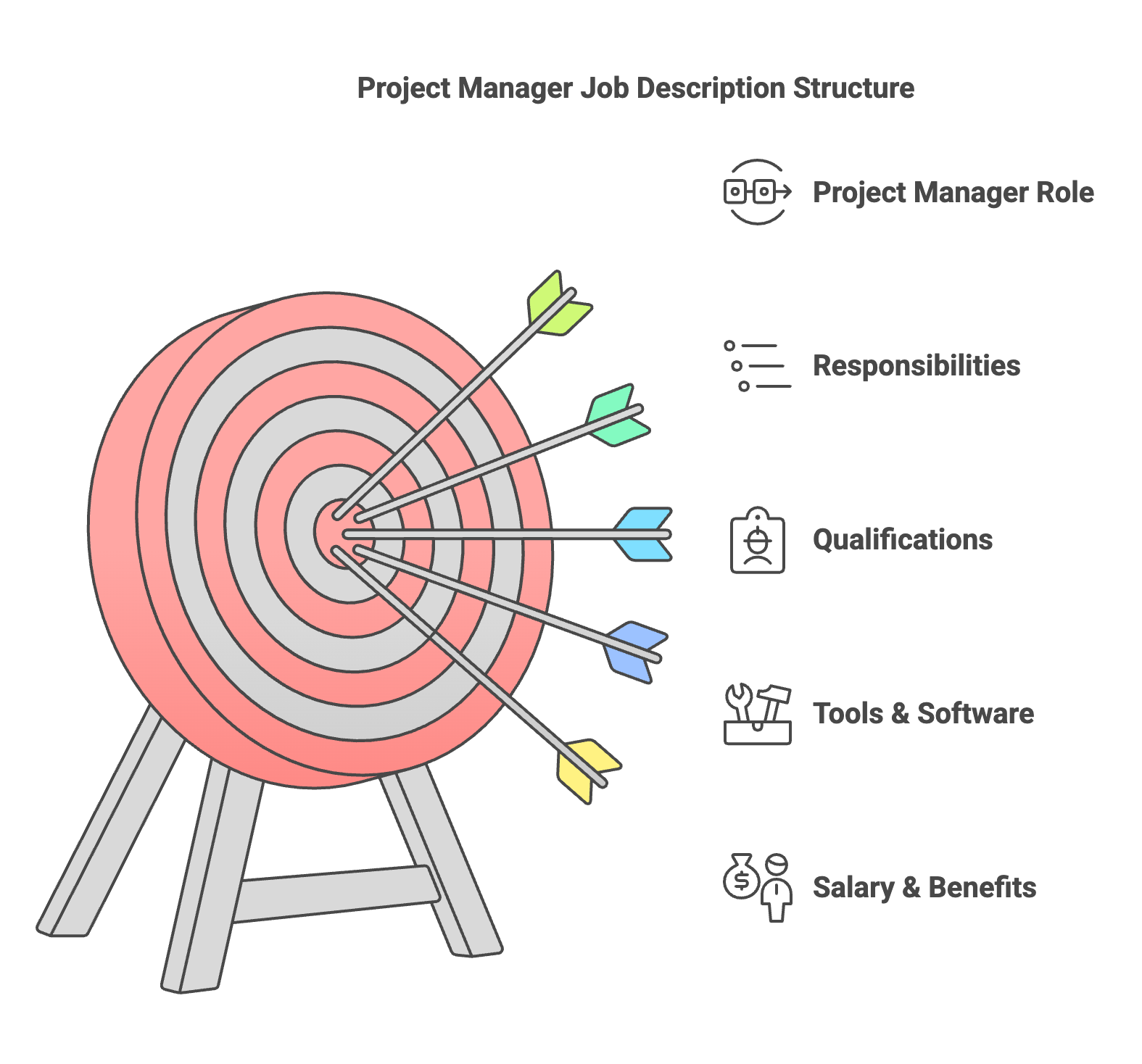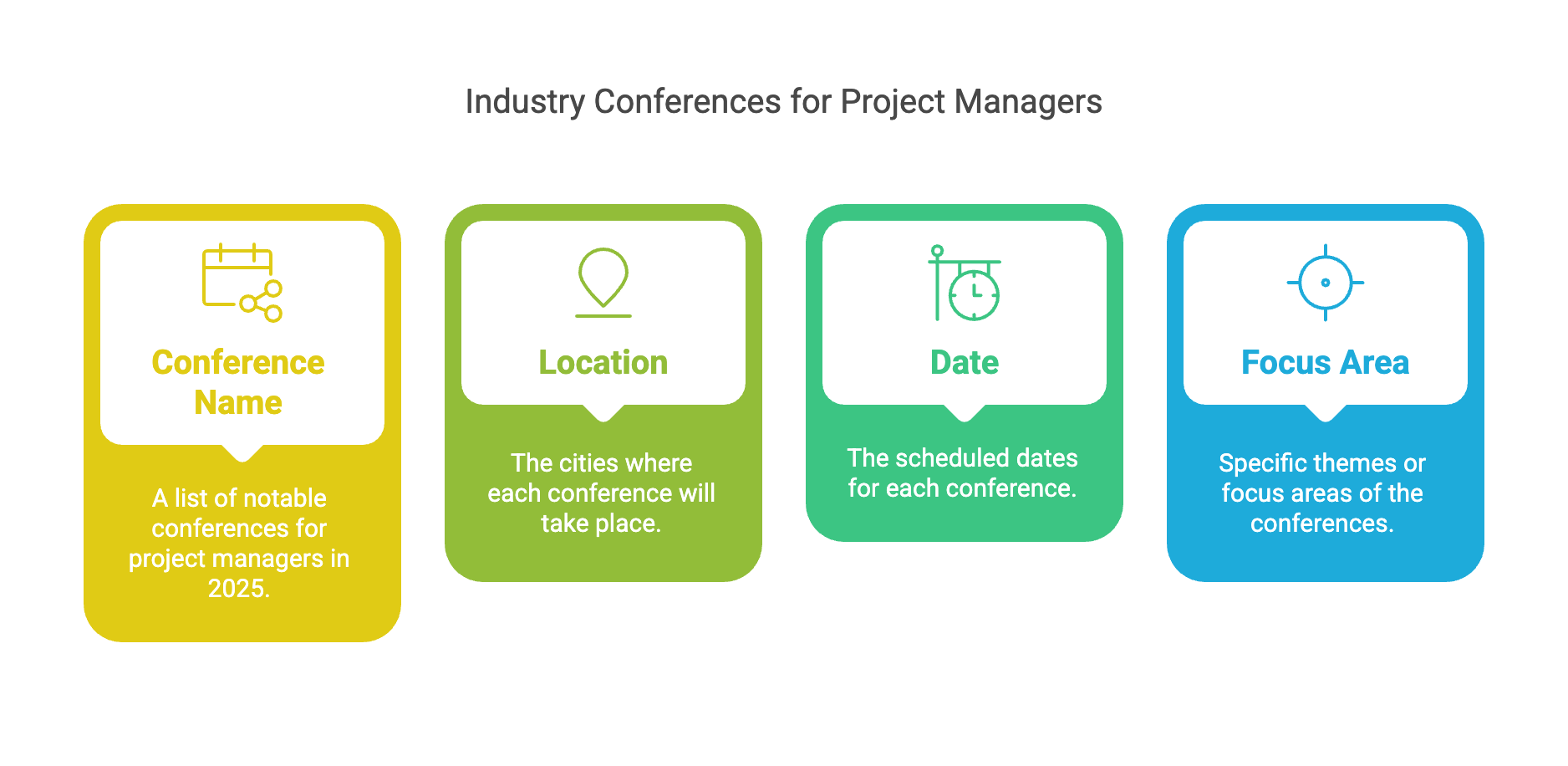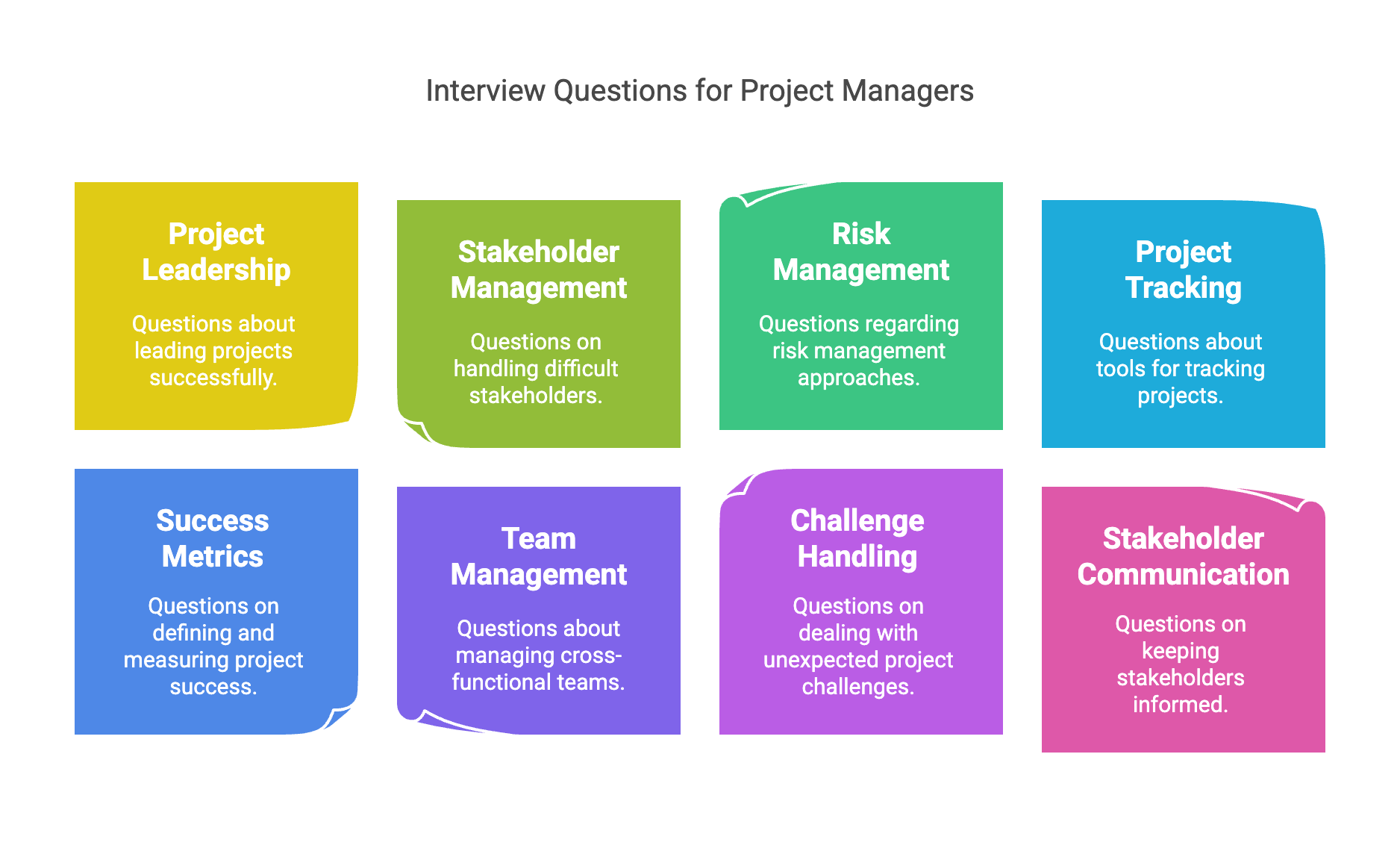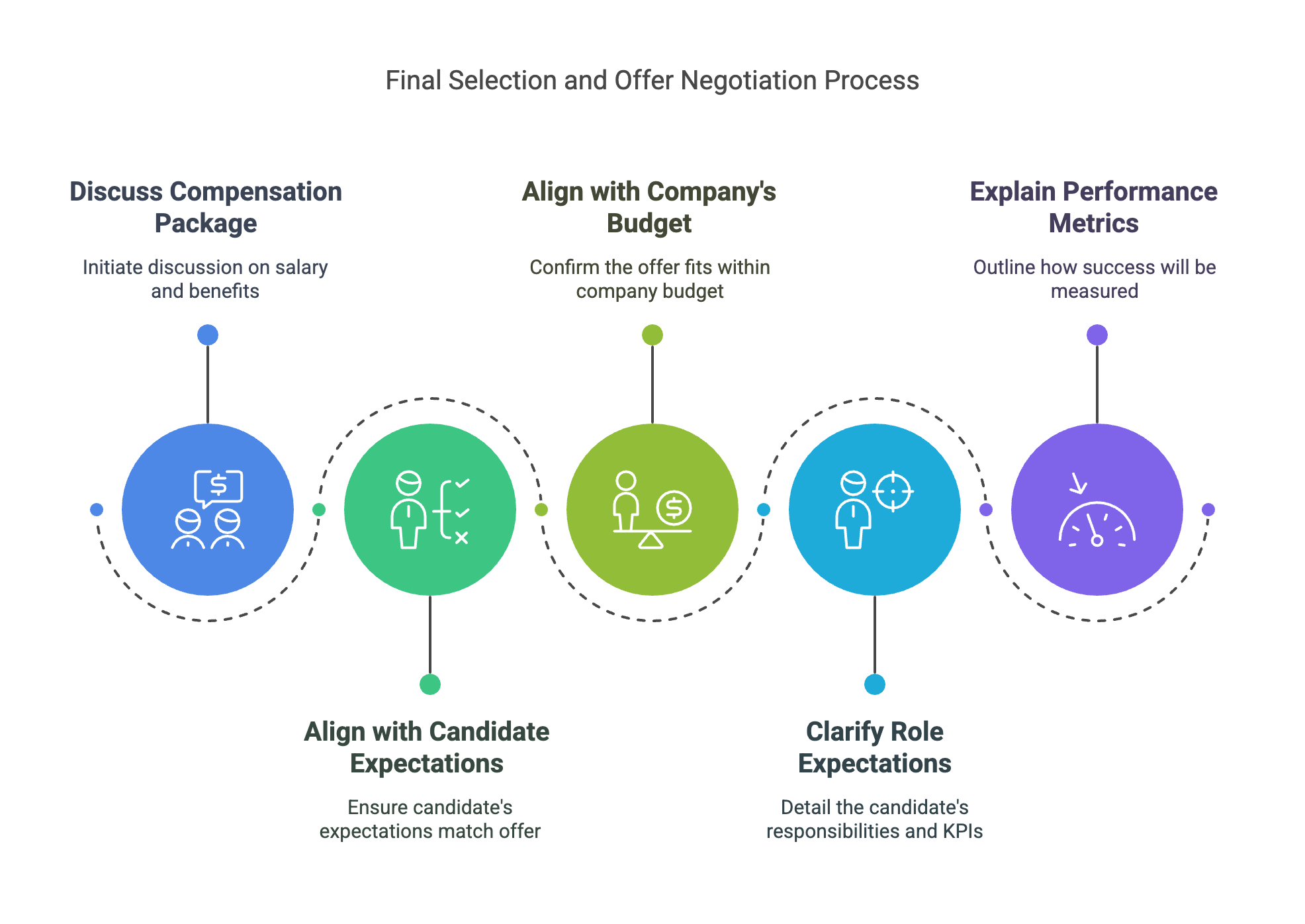Skilled Project managers (PMs) are crucial for businesses because they ensure projects are completed on time, within budget, and aligned with strategic goals, leading to improved efficiency and increased revenue. They provide structure and direction to complex initiatives, manage risks, and foster team collaboration. They are responsible for planning, organizing, and overseeing projects, ensuring they meet desired outcomes while optimizing resource allocation.
The average salary for a PM in the US ranges from approximately $90,144 to $116,000. However, total compensation, including additional cash compensation, averages around $108,043. Salaries can range from $52,000 to $159,150, and even up to $270,000 depending on experience, industry, location, and specialization. Furthermore, they tend to stay in their jobs for 1-2 years.
So, how to hire a Project manager? Business owners must create a clear job description, evaluate candidates for relevant experience, conduct thorough interviews, and make competitive offers.
Talk to the recruiting specialist about how outsourcing can provide access to a broader talent pool and reduce hiring timelines. PM roles are difficult to fill due to a shortage of skilled professionals, evolving skill requirements, integration, and alignment challenges.
With Go Carpathian, businesses can hire the best Project managers from Eastern Europe, South Africa, and Latin America for 40-70% less compared to traditional hiring in Western countries
In this post, we will cover what a Project manager does, what types of PMs exist, how to hire a PM, what skills they should possess, how to write the perfect PM job description, how to conduct an interview with a PM and onboard them successfully.
What Does a Project Manager Do?
A PM orchestrates projects from start to finish, ensuring success through careful planning, diligent execution, and timely delivery while managing resources and communication. Here’s a breakdown of their key responsibilities:
Oversees project planning, execution, and delivery: This involves defining goals, creating a detailed plan, guiding the team through the execution phase, and ensuring the final product or service is delivered successfully.
Ensures projects are completed on time, within scope, and on a budget: The PM sets realistic timelines, defines the project scope to avoid “scope creep,” and prevents overspending.
Coordinates between teams, stakeholders, and vendors: This role involves acting as a central point of contact, fostering communication and collaboration among internal teams, external stakeholders, and third-party vendors to ensure everyone is aligned and informed.
Identifies and mitigates risks to avoid project failures: A PM proactively identifies potential risks that could derail the project and develops strategies to mitigate those risks, minimizing negative impacts.
Tracks project performance and implements necessary adjustments: Using various metrics, the PM monitors progress, identifies deviations from the plan, and makes necessary adjustments to keep the project on track and achieve desired outcomes.
When do you need to hire a Project manager?
You need to hire a PM as soon as possible if you notice that your team is disorganized, tasks aren’t getting done, projects consistently exceed timelines or budgets, or communication is breaking down. This role can help founders transition to a big-picture focus, remove administrative tasks from employee workload, facilitate teamwork, and manage client expectations.
Different Types of Project Managers
Different types of PMs specialize in various industries and project types, each requiring specific knowledge and skills. Here’s a breakdown of some common types:
IT PM: Handles software development, system implementation, cybersecurity, and other IT-related projects.
Construction PM: Manages building projects, and site coordination, and ensures compliance with regulations.
Marketing PM: Oversees campaign planning, digital marketing efforts, and branding initiatives.
Engineering PM: Focuses on technical projects, research, and development, these PMs require a strong understanding of engineering principles.
Operations PM: Focuses on improving business processes, supply chain logistics, and overall operational efficiency.
How to Hire a Project Manager
To hire a Project manager, business owners need to understand their needs first. They need to define the role’s requirements, the skills needed, and the experience level. Next, they need to write a clear role description reflecting the role’s responsibilities and expectations. Then, screen candidates for experience and knowledge in their field. They need to test them by using interviews to assess their expertise, problem-solving abilities, leadership style, and soft skills like communication and collaboration.
Determining the Right Project Manager for Your Business
Determining the right PM involves aligning their expertise with your business needs and project characteristics. Here’s how to assess your requirements:
What type of projects will they manage?
Define the nature of projects the PM will oversee, considering factors like complexity, scope, and industry-specific requirements. Project selection should align with the broader company strategy.
Do you need a generalist or a specialist in a specific field?
Decide whether you need a PM with broad experience across different project types (generalist) or someone with in-depth knowledge in a specific area like IT, construction, or marketing (specialist). An experienced manager often possesses specific knowledge and skills that higher-level executives may not.
What project management methodology fits your company?
Determine which Project management approach (e.g., Agile, Scrum, Waterfall, Lean, Kanban) aligns with your company culture and project requirements. Different methodologies suit different projects, so choose a PM familiar with your preferred approach.
Defining the Level of Experience Required
When defining the level of experience needed for a PM, consider the complexity and scale of the projects they’ll be handling:
Entry-level Project managers: These PMs are ideal for small, straightforward projects with well-defined business goals and minimal risk. They typically have some formal training or certification but less hands-on experience.
Mid-level Project managers: Suited for handling complex tasks with moderate oversight, these PMs possess several years of experience and can manage multiple projects concurrently. They are capable of dealing with unexpected challenges and require less direct supervision.
Senior Project managers: Highly experienced and skilled, these PMs are suitable for large-scale, high-stakes projects that require strong leadership, strategic thinking, and extensive risk management capabilities. They often oversee multiple teams and manage complex budgets.
Choosing Between Hiring Options
When choosing between hiring options, weigh the pros and cons of each approach based on your project needs and organizational structure:
Full-time employee:
Hiring a full-time PM is best for long-term projects and providing dedicated team leadership, as they become fully integrated into your company culture and have a vested interest in long-term success.
Contract or freelance PM:
Engaging a contract or freelance PM is a good choice for short-term projects or specific initiatives, offering flexibility and specialized skills without the commitment of a full-time hire.
In-house vs. remote:
Consider whether an in-house PM or a remote PM better suits your business needs, taking into account factors like the need for physical presence, collaboration tools, and the ability to manage teams across different locations.
What are some Essential Qualifications of a Project Manager?
Essential qualifications for a PM encompass a blend of education, experience, technical skills (including IT, budgeting, and risk management), and soft skills like communication, leadership, and time management, alongside a solid understanding of project management methodologies. They must be effective at planning, monitoring, and reviewing projects to ensure quality, scope, cost, and time are well-managed. Certifications such as PMP or PRINCE2 can also validate their knowledge and skills.
1. Educational Background
A solid educational foundation is crucial for PMs, often involving:
Bachelor’s or Master’s Degree: Common fields of study include Business Administration, Project Management, Engineering, IT, or a related area. These degrees provide a broad understanding of management principles, project methodologies, and industry-specific knowledge.
Industry-Specific Education: For specialized roles (e.g., IT, Construction), PMs often benefit from additional education or certifications specific to that industry. This ensures they have the technical knowledge to work within those domains effectively.
2. Certifications That Add Value
Certifications can significantly enhance a PM’s credentials and career prospects. Here are some valuable certifications:
Project Management Professional (PMP): This is a globally recognized certification that validates a PM’s expertise and leadership skills in any working method, be it predictive, hybrid, or agile. PMP certification can lead to higher salaries, with certified PMs earning approximately 22% more than their non-certified peers. It also increases professional credibility and employability, demonstrating a commitment to the profession.
Certified ScrumMaster (CSM): Ideal for Agile management, this certification demonstrates an understanding of Scrum principles and practices.
PRINCE2 Certification: Best for structured PM methodologies, PRINCE2 (Projects IN Controlled Environments) provides a framework for managing work in a controlled and organized manner.
Six Sigma Certification: This certification is valuable for PMs focused on process improvement and efficiency, providing them with tools and techniques to reduce defects and improve quality.
3. Technical & Soft Skills
Technical Skills:
Technical skills are essential for effectively managing tasks, especially those involving technology or IT. These skills enable many Project managers to lead and oversee various project aspects, ensuring projects are delivered on time, within budget, and to stakeholders’ satisfaction.
Here’s a breakdown of key technical skills:
Expertise in project management tools: Proficiency in software like Jira, Trello, Asana, Monday.com, and MS Project is crucial for planning, scheduling, resource allocation, and progress tracking. Managers need to determine which tools and features are best for their team’s workflow.
Risk analysis and resource allocation: This involves identifying potential risks and developing mitigation plans to keep projects on track. It also requires the ability to accurately enter task durations, dependencies, and resource assignments, potentially using formulas, filters, or other data manipulation processes.
Data-driven decision-making: Managers must gather relevant data across sources, analyze it to identify trends, and use this data to make informed decisions. This includes creating and interpreting Gantt charts and project dashboards to communicate information with stakeholders. Effective research is essential to a project’s success.
Soft Skills:
Soft skills are also very important, enabling managers to lead teams effectively. These interpersonal abilities often make the biggest difference in retaining key talent.
Here are essential soft skills:
Leadership and team motivation: Managers use leadership skills to guide teams toward achieving goals by setting the tone, articulating a vision, and engaging team members. They motivate team members to perform at their best by offering guidance, support, and demonstrating empathy, fostering teamwork and collaboration.
Conflict resolution: Managers must address conflicts and solve problems effectively to keep projects on track. This involves clear communication, active listening, and implementing fair and efficient resolution strategies.
Negotiation and stakeholder engagement: Managers negotiate with stakeholders to manage expectations, secure resources, and align project objectives with stakeholder needs. Effective negotiation skills are vital for building strong relationships and ensuring stakeholder satisfaction.
Key Skills and Qualities of a Great Project Manager
A great PM excels in blending leadership with strategic thinking, fostering open communication, mitigating risks effectively, managing finances prudently, balancing time across multiple projects, and adapting to diverse environments.
Here’s a closer look at the key skills:
Strong leadership and decision-making abilities
They confidently guide teams, making decisions under pressure to keep projects on track.
Excellent communication and stakeholder management
They convey information and manage expectations, ensuring all stakeholders are aligned and informed.
Risk assessment skills
They proactively identify and mitigate potential issues, finding creative solutions to keep projects moving forward.
Budgeting and financial management experience
They manage finances effectively, ensuring projects stay within budget and maximize value.
Time management and ability to handle multiple projects
They prioritize tasks, manage schedules efficiently, and juggle multiple projects without compromising quality.
Adaptability to different industries and work environments
They quickly learn and adapt to new industries, technologies, and work environments, ensuring project success in any setting.
Writing the Perfect Project Manager Job Description
We have good news: writing a perfect Project manager role description isn’t too difficult. You need to focus on clarity and detail to attract the right candidates. Here’s a breakdown of essential elements:
Job Title: Clearly define the role, such as “Senior IT Project Manager” or “Marketing Project Manager,” to attract candidates with experience.
Responsibilities: List core job duties and expectations, including planning, executing, monitoring, and closing projects, as well as coordinating teams and managing budgets. Highlight the responsibility for the direction, coordination, implementation, executive control, and completion of projects while aligning with the organization’s strategy.
Qualifications: Highlight must-have experience, skills, and certifications, such as a bachelor’s degree in a related field, experience, and certifications like PMP or PRINCE2. Emphasize skills like leadership, communication, and time management.
Tools & Software: Specify familiarity with key tools like Jira, Trello, Asana, Monday.com, and MS Project, as well as MS Office.
Salary & Benefits: Mention the salary range, perks, and career growth opportunities to attract top talent.
Sample Job Description
Job Title: Senior Project Manager
Location: Remote / In-Office
Job Type: Full-time / Contract
About [Company Name]:
[Insert a brief, engaging overview of your company, its mission, and values. Highlight what makes your company a great place to work.]
Job Summary:
We are seeking a highly motivated and experienced Senior Project manager to lead and manage a variety of projects. The ideal candidate will be a strategic thinker with excellent communication and organizational skills, capable of driving projects to successful completion while meeting deadlines and staying within budget.
Responsibilities:
Plan, execute, and close projects successfully, ensuring adherence to timelines, budget, and quality standards.
Define project scope, objectives, and deliverables in collaboration with stakeholders.
Develop detailed project plans, schedules, and resource allocation strategies.
Coordinate with cross-functional teams and stakeholders to ensure seamless project execution.
Monitor project progress using KPIs and reporting tools, and provide regular status updates to stakeholders.
Identify and manage risks and issues, developing mitigation strategies as needed.
Ensure effective communication and collaboration among team members and stakeholders.
Lead and mentor junior project team members.
Manage budgets and track expenses.
Qualifications:
Bachelor’s degree in a related field; Master’s degree preferred.
PMP or equivalent certification is required.
5+ years of progressive experience in project management, with a proven track record of successfully delivering projects.
Proficiency in Agile and Scrum methodologies.
Strong leadership, communication, and interpersonal skills.
Excellent analytical abilities.
Proficient in software such as Jira, Asana, or MS Project.
Ability to work independently and as part of a team.
Bonus Points:
Experience in [relevant industry] is highly desirable.
Knowledge of [specific software or technology] is a plus.
Salary & Benefits:
We offer a competitive salary commensurate with experience, along with a comprehensive benefits package including:
[List specific benefits: Health insurance, paid time off, retirement plan, professional development opportunities, etc.]
Career Growth Opportunities:
[Describe opportunities for advancement within the company, such as leadership roles or specialization in a particular area.]
To Apply:
[Provide instructions on how to apply for the position.]
This role description provides a comprehensive overview of the position, ensuring that potential candidates have a clear understanding of the role and its requirements.
Good luck with your hiring process!
Where to Find the Best Project Managers
Finding the best PMs can be challenging due to a shortage of skilled professionals and evolving skill requirements. Organizations often struggle with integrating new hires, facing geographic constraints, and dealing with inefficient recruitment processes. With Go Carpathian, business owners can tap into the global talent pool and find highly skilled talents while reducing hiring costs.
Schedule a talk with the recruiting specialist to get matched with the best, pre-vetted candidates from Eastern Europe, South Africa, and Latin America.
1. Online Job Boards & Professional Networks
Online job boards and professional networks are key resources for finding the perfect hire, with general platforms offering broad reach and industry-specific platforms providing targeted access.
LinkedIn: A professional networking site that has over 1 billion users worldwide. This makes LinkedIn one of the best spots to connect with and source potential candidates.
Indeed, Glassdoor, and ZipRecruiter: General job boards that feature project management positions across various industries.
Industry-specific job platforms: Such as the PMI Career Center, which focuses exclusively on project management roles. Dice is a job board that specializes in technology-related job postings, including PM positions.
2. Freelance & Contract Platforms
Freelance and contract platforms offer business owners opportunities to find experienced candidates. Toptal offers rigorous talent vetting, while Upwork provides a broad marketplace with various skill levels. We Work Remotely specializes in remote positions, and Fiverr Pro caters to those seeking higher-end, professional services. These platforms streamline the process of connecting businesses with skilled hires for specific needs
3. Networking & Referrals
Networking and referrals are invaluable for PMs, enabling them to tap into hidden job markets and gain insider advantages. Leveraging employee referral programs can lead to quality hires who already align with the company culture.
Furthermore, attending industry conferences and events provides opportunities to make connections, learn about the latest trends, and meet potential collaborators and employers. Proactive engagement and building genuine relationships are key to expanding one’s professional network and uncovering new opportunities.
Here are a few industry conferences and events in the US for PMs in 2025:
Project Management Symposium in College Park, MD, in May 2025.
Project Summit Business Analyst World in Orlando, FL, in May 2025.
Women of PM 2025 Conference in New Orleans, LA, in June 2025. This event is dedicated to Black women in PM and will feature sessions on leadership, mentorship, career growth, and mental wellness.
Agile2025 in Denver, CO, in July 2025.
Digital PM Summit in Portland, OR, in October 2025.
PMI Global Summit in Phoenix, AZ, in November 2025.
19th Annual Project Management in Practice Conference in Boston, MA, June 13-14, 2025.
ProductWorld 2025 in San Francisco, CA, in April 2025.
PMI Training Scottsdale 2025 in Scottsdale, AZ, February 24-27, 2025.
4. Offshoring Partners
Hiring Project managers in-house can be pricey due to factors like salaries, bonuses, benefits, and potential profit-sharing arrangements.
With professional outsourcing agencies like Go Carpathian, business owners can find the best hires in top global outsourcing hubs, such as Eastern Europe, South Africa, and Latin America. Go Carpathian matches businesses with pre-vetted candidates who can align with organizational culture. This process is much easier for business owners because it saves businesses money on tools, equipment, office space, labor costs, and expenses related to hiring and training in-house staff.
Screening and Shortlisting Candidates
Screening and shortlisting product management candidates involves a careful review of resumes and cover letters to identify individuals with experience and skills. Look for experience in market research, roadmap planning, and cross-functional collaboration. However, there are also some red flags to look for. Here’s everything you need to know about screening and shortlisting candidates:
Reviewing Resumes & Cover Letters
When reviewing resumes and cover letters of potential hires, always prioritize candidates with experience in similar industries, demonstrating their familiarity with industry-specific challenges and best practices. Identify candidates who possess expertise in relevant software like Jira, Asana, or MS Project, indicating their proficiency in planning, tracking, and reporting on projects. Evaluate their leadership and team management experience, looking for examples of successful team collaboration, conflict resolution, and the ability to drive projects to completion while motivating and guiding team members.
Red Flags to Watch For
When screening candidates, be wary of resumes that lack quantifiable achievements, suggesting a potential inability to measure and demonstrate project success. Furthermore, watch out for job-hopping without solid reasons, as this may indicate instability or difficulty committing to long-term projects. Also, keep in mind that vague descriptions of previous projects could signal a lack of direct involvement or a failure to articulate clear project goals and outcomes.
Conducting Effective Interviews for PMs
Conducting effective interviews for PMs involves a multi-stage approach. The initial screening should focus on assessing soft skills and culture fit, ensuring the candidate’s communication style and values align with the team. The technical interview should delve into PM scenarios and methodologies, evaluating their practical knowledge. The final round should emphasize leadership assessment and problem-solving skills, gauging their capacity to guide teams, resolve conflicts, and make strategic decisions under pressure.
2. Best Interview Questions
To assess candidates effectively, use targeted questions that reveal their relevant experience, skills, and approaches.
Here are some of the best interview questions to ask PMs:
“Tell us about a project you successfully led from start to finish”
“How do you handle difficult stakeholders?”
“How do you approach risk management in projects?”
“What tools do you use for project tracking and reporting?”
How do you define success for a project, and what metrics do you use to measure it?
What is your experience in managing and leading cross-functional teams?
Can you describe a time when you had to handle an unexpected challenge during a project, and how you dealt with it?
How do you ensure that you keep all stakeholders informed and up-to-date throughout the project lifecycle?
3. Practical Assessments
Practical assessments for PMs involve evaluating their skills through real-world scenarios. Case studies and problem-solving tasks require candidates to demonstrate their ability to manage projects from start to finish, allocate resources, and mitigate risks. Situational judgment tests present realistic workplace dilemmas to assess decision-making and problem-solving skills under pressure. These assessments offer insights into a candidate’s ability to apply their knowledge effectively in a professional environment.
Evaluating and Making the Right Hire
Evaluating and making the right hire for PMs involves comparing top candidates based on their skills, experience, and cultural fit. The final selection should be based on a combination of factors, including interview performance, practical assessments, and alignment with the organization’s needs.
1. Comparing Top Candidates
Comparing top candidates involves carefully weighing their experience, skills, and cultural fit to determine the best match for the organization’s needs. Thoroughly consider references from past employers to validate their performance and work ethic. Also, evaluate their salary expectations and benefits alignment to ensure they are reasonable and within the company’s budget and compensation structure.
2. Final Selection & Offer Negotiation
In the final selection and offer negotiation phase for PMs, the compensation package should be discussed transparently, covering salary, bonuses, benefits, and any potential equity or profit-sharing arrangements, ensuring it aligns with the candidate’s expectations and the company’s budget. Clarify role expectations and performance metrics, detailing responsibilities, key performance indicators (KPIs), and how success will be measured, so the candidate understands their objectives and how their performance will be evaluated.
Onboarding Your New Project Manager
Onboarding a new PM involves setting them up for success from day one. Provide them with clear goals and KPIs, so they understand what’s expected and how their performance will be measured. Introduce them to key stakeholders across different teams, facilitating collaboration and communication. Grant them access to necessary tools and software, ensuring they have the resources to effectively manage projects and track project progress.
Training & Continuous Development
Training and continuous development are crucial for PMs to stay updated with industry trends, improve skills, and lead project teams effectively. Encourage PMs to pursue certification upgrades, such as the Project Management Professional (PMP) or Certified Associate in Project Management (CAPM), which can enhance their credibility and provide a competitive advantage. Additionally, assigning mentorship or coaching programs can facilitate knowledge exchange and provide personalized guidance, helping Project managers develop leadership, communication, and management skills. Continuous learning helps Project managers adapt to new methodologies, tools, and best practices, improving project outcomes and career advancement opportunities.
Need to hire a Project Manager?
The PM hiring process involves screening candidates for skills and experience, conducting interviews and assessments to evaluate problem-solving and leadership abilities, and then making an offer with clear expectations. Onboarding and continuous development ensure the new hire is set up for success and stays up-to-date with industry best practices.
To ensure a smooth recruitment experience, clearly define job requirements, communicate openly with candidates, and provide prompt feedback throughout the process. By prioritizing a positive candidate experience and making decisions, you’ll attract top talent and improve your chances of hiring the right PM for your team.
Investing in a strong hire is essential for long-term business growth because they align initiatives with strategic goals, streamline operations, manage resources, and mitigate risks, leading to improved efficiency, reduced costs, and increased profitability
Interested in hiring a Project manager? With Go Carpathian, you can hire the top talent overseas while reducing hiring costs. Schedule a Discovery Call to learn more.



